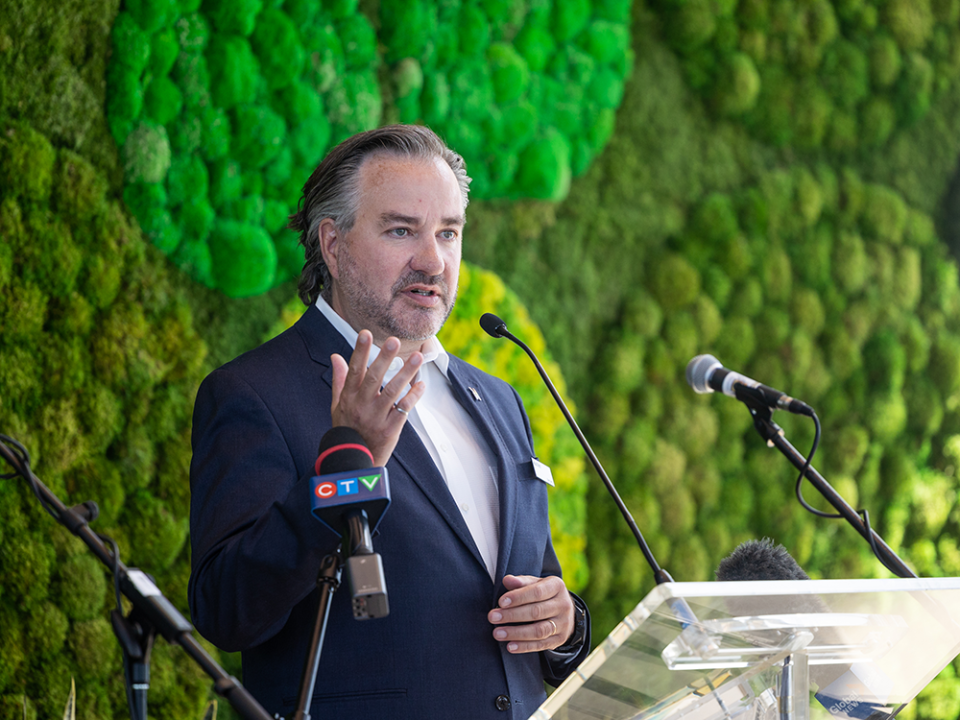Nutrien ramping up production as Ukraine conflict creates 'room in the market': CEO

Nutrien Ltd., the largest fertilizer company in the world, says Russia’s invasion of Ukraine continues to disrupt global food chains.
The Saskatoon-based company on Wednesday posted record net earnings in 2022 of US$7.7 billion, while noting its sales flagged in the fourth quarter as the rising price of potash led some farmers to reduce usage.
Nonetheless, Nutrien said it plans to increase its production this year to between 13.8 million and 14.6 million tonnes — up from 12.5 million tonnes in 2022, saying that rising crop prices are offsetting rising potash prices.
Looking more broadly, chief executive Ken Seitz said the conflict in Ukraine has created challenges for both Belarus and Russia, which together have accounted for 40 per cent of global potash production. The result is immediate and long-term effects on the market, Seitz said.
“If you look at the new production that was to come to the market over the next five years, 60 per cent of that outside of our own increases was to be coming from Russia and Belarus,” said Seitz, “and that we believe those projects are delayed.”
More immediately, he said Russian production would decline 15 to 30 per cent in 2023, while Belarusian production would decline 40 to 60 per cent. Already, he cited reports that Belarusian production had declined 50 per cent in recent months due to challenges shipping out of tidewater ports in Ukraine.
“So it all has the effect of creating room in the market,” said Seitz, “and that’s where we say we’re ramping up our volumes to meet the growing demand.”
Eventually, he expects trade channels will reshuffle and production from those regions will normalize and planned expansions will move forward. But he predicted it would take at least another year or two for that to happen.
Beyond the conflict in Ukraine and rising crop and fertilizer prices, potash and other fertilizers have drawn interest for reasons related to climate change.
In late 2021, Australia’s BHP Group, the largest mining company in the world, made a final decision to build its US$5.7 billion Jansen project, the largest planned potash mine in the world, just east of Saskatoon, which would initially produce 4.35 million tonnes per year and could be operational by 2026.
Echoing others in the potash industry, such as Seitz, BHP chief executive Mike Henry has predicted that as world population grows and the amount of arable land declines, potash demand also will need to grow in order to increase crop yields.
“At the heart of our purpose is to help solve some of these food insecurity challenges,” Seitz said.
Last year, Nutrien returned US$5.6 million to shareholders through dividends and buybacks, according to its fourth quarter earnings presentation. Its adjusted EBITDA from potash grew 111 per cent to US$5.7 billion, as its sales volumes outside of North America increased.
Still, despite its favourable outlook, Nutrien also backed off slightly from its long-term potash production target of 18 million tonnes by 2025 — saying instead it would aim to reach that by 2026.
Barrick's Mark Bristow 'struggling' to understand logic behind rival Newmont's strategy
Alberta miner replaces Chinese investor that Ottawa barred from owning Canadian assets
Teck Resources evaluating options for coal business, possible spinoff
Chris Reynolds, executive vice-president of potash at Nutrien, said the increases would involve purchasing underground mining equipment and conveyor belts, and that it could be delayed beyond 2026.
“If things would have changed materially … we could delay the purchasing of some of this equipment,” Reynolds said on the earnings call on Thursday to discuss the latest results. “But again, the longer term outlook that we have and the need that we believe the global market is going to have for 18 million tonnes from Nutrien is still intact.”
Seitz stressed that uncertainties in the market mean that Nutrien aims to be nimble, so that it can increase production as needed.
“I think that we’re in a period of uncertainty and volatility over the coming years here, given all of these movements,” he said on the call with analysts.
Correction: An earlier version of this story used ounces in reference to planned production figures from BHP’s proposed potash mine in Saskatchewan. It should have said tonnes. We regret the error.
• Email: gfriedman@postmedia.com | Twitter: GabeFriedz

 Yahoo Finance
Yahoo Finance 